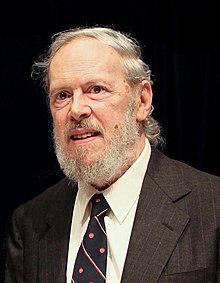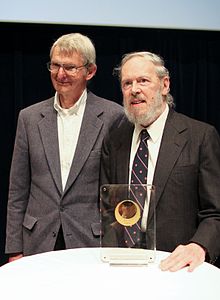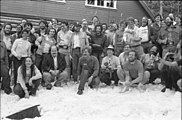Dennis Ritchie
Dennis MacAlistair Ritchie | |
|---|---|
 Dennis Ritchie, 2011 | |
| Born | September 9, 1941 Bronxville, New York, U.S. |
| Died | c. October 12, 2011 (aged 70) |
| Nationality | American |
| Alma mater | Harvard University (Ph.D., 1968) |
| Known for | ALTRAN B BCPL C Multics Unix |
| Awards | Turing Award (1983) National Medal of Technology (1998) IEEE Richard W. Hamming Medal (1990) Computer Pioneer Award (1994) Computer History Museum Fellow (1997)[1] Harold Pender Award (2003) Japan Prize (2011) |
| Scientific career | |
| Fields | Computer science |
| Institutions | Lucent Technologies Bell Labs |
Dennis MacAlistair Ritchie (September 9, 1941 – c. October 12, 2011)[2][3][4][5] was an American computer scientist.[2] He created the C programming language and, with long-time colleague Ken Thompson, the Unix operating system.[2] Ritchie and Thompson received the Turing Award from the ACM in 1983, the Hamming Medal from the IEEE in 1990 and the National Medal of Technology from President Clinton in 1999. Ritchie was the head of Lucent Technologies System Software Research Department when he retired in 2007. He was the "R" in K&R C, and commonly known by his username dmr.
Personal life
Ritchie was born in Bronxville, New York. His father was Alistair E. Ritchie, a longtime Bell Labs scientist and co-author of The Design of Switching Circuits on switching circuit theory. He moved with his family to Summit, New Jersey, as a child, where he graduated from Summit High School.[6] He graduated from Harvard University with degrees in physics and applied mathematics.
Career


In 1967, Ritchie began working at the Bell Labs Computing Sciences Research Center, and in 1968, he defended his PhD thesis on "Program Structure and Computational Complexity" at Harvard under the supervision of Patrick C. Fischer. However, Ritchie never officially received his PhD degree.[7]
Ritchie was best known as the creator of the C programming language, a key developer of the Unix operating system, and co-author of the book The C Programming Language, and was the 'R' in K&R (a common reference to the book's authors Kernighan and Ritchie). Ritchie worked together with Ken Thompson, the scientist credited with writing the original Unix; one of Ritchie's most important contributions to Unix was its porting to different machines and platforms.[8] They were so influential on Research Unix that Doug McIlroy later wrote, "The names of Ritchie and Thompson may safely be assumed to be attached to almost everything not otherwise attributed."[9]
The C language is widely used today in application, operating system, and embedded system development, and its influence is seen in most modern programming languages. Unix has also been influential, establishing concepts and principles that are now precepts of computing.
Ritchie has described a 1970s collaboration with James Reeds and Robert Morris on a ciphertext-only attack on the M-209 US cipher machine that could solve messages of at least 2000–2500 letters.[10] Ritchie relates that, after discussions with the NSA, the authors decided not to publish it, as they were told the principle was applicable to machines then still in use by foreign governments.[10]
Views on computing
In an interview from 1999, Dennis Ritchie clarifies that he sees Linux and BSD operating systems as a continuation of the basis of the Unix operating system, and as derivatives of Unix:[11]
I think the Linux phenomenon is quite delightful, because it draws so strongly on the basis that Unix provided. Linux seems to be among the healthiest of the direct Unix derivatives, though there are also the various BSD systems as well as the more official offerings from the workstation and mainframe manufacturers.
In the same interview, he states that he views both Unix and Linux as "the continuation of ideas that were started by Ken and me and many others, many years ago."[11]
Awards
In 1983, Ritchie and Thompson received the Turing Award for their development of generic operating systems theory and specifically for the implementation of the UNIX operating system. Ritchie's Turing Award lecture was titled "Reflections on Software Research".[12] In 1990, both Ritchie and Thompson received the IEEE Richard W. Hamming Medal from the Institute of Electrical and Electronics Engineers (IEEE), "for the origination of the UNIX operating system and the C programming language".[13]
In 1997, both Ritchie and Thompson were made Fellows of the Computer History Museum, "for co-creation of the UNIX operating system, and for development of the C programming language."[14]
On April 21, 1999, Thompson and Ritchie jointly received the National Medal of Technology of 1998 from President Bill Clinton for co-inventing the UNIX operating system and the C programming language which, according to the citation for the medal, "led to enormous advances in computer hardware, software, and networking systems and stimulated growth of an entire industry, thereby enhancing American leadership in the Information Age".[15][16]
In 2005, the Industrial Research Institute awarded Ritchie with its Achievement Award in recognition of his contribution to science and technology, and to society generally, with his development of the Unix operating system.[17]
In 2011, Ritchie, along with Thompson, was awarded the Japan Prize for Information and Communications for his work in the development of the Unix operating system.[18]
Death and legacy

Ritchie was found dead on October 12, 2011, at the age of 70 at his home in Berkeley Heights, New Jersey, where he lived alone.[2] First news of his death came from his former colleague, Rob Pike.[3][4] The cause and exact time of death have not been disclosed.[19] He had been in frail health for several years following treatment for prostate cancer and heart disease.[2][3][20][21] His death came a week after the death of Steve Jobs but did not receive as much media coverage.[22][23][24] Following Ritchie's death, computer historian Paul E. Ceruzzi stated:[25]
Ritchie was under the radar. His name was not a household name at all, but... if you had a microscope and could look in a computer, you'd see his work everywhere inside.
In an interview shortly after Ritchie's death, long time colleague Brian Kernighan said Ritchie never expected C to be so significant.[26] Kernighan reminded readers of how important a role C and UNIX had played in the development of later high-profile projects, such as the iPhone.[27][28] Other testimonials to his influence followed.[29][30][31][32]
The Fedora 16 Linux distribution, which was released about a month after he died, was dedicated to his memory.[33] FreeBSD 9.0, released January 12, 2012 was also dedicated in his memory.[34]
-
Ritchie engaged in conversation in a chalet in the mountains surrounding Salt Lake City at the 1984 Usenix conference.
-
At the same Usenix 1984 conference, Dennis Ritchie is visible in the middle, behind Steven Bellovin wearing a baseball hat.
Notable work
- C (programming language) on which many currently used languages and technologies are based.
- Unix a multiuser operating system. Several workalikes (commonly referred to as Unix-like systems) have been developed based on Unix's design. Some of these follow POSIX standards, again based on Unix.
- Unix Programmer's Manual (1971)
- The C Programming Language (book) (sometimes referred to as K&R; 1978 with Brian Kernighan)
References
- ^ Dennis Ritchie 1997 Fellow
- ^ a b c d e Lohr, Steve (October 12, 2011), "Dennis Ritchie, Programming Trailblazer, Dies at 70", The New York Times, retrieved October 13, 2011,
Dennis M. Ritchie, who helped shape the modern digital era by creating software tools that power things as diverse as search engines like Google and smartphones, was found dead on Wednesday at his home in Berkeley Heights, N.J. He was 70. Mr. Ritchie, who lived alone, was in frail health in recent years after treatment for prostate cancer and heart disease, said his brother Bill.
- ^ a b c "Unix creator Dennis Ritchie dies aged 70". BBC News. October 13, 2011. Retrieved October 14, 2011.
Pioneering computer scientist Dennis Ritchie has died after a long illness. ... The first news of Dr Ritchie's death came via Rob Pike, a former colleague who worked with him at Bell Labs. Mr Ritchie's passing was then confirmed in a statement from Alcatel-Lucent which now owns Bell Labs.
- ^ a b Rob Pike (October 12, 2011), (untitled post to Google+), retrieved October 14, 2011,
I just heard that, after a long illness, Dennis Ritchie (dmr) died at home this weekend. I have no more information.
- ^ Campbell-Kelly, Martin (October 13, 2011), "Dennis Ritchie obituary", The Guardian, retrieved October 13, 2011,
Dennis MacAlistair Ritchie, computer scientist, born 9 September 1941; died 12 October 2011
- ^ Keill, Liz. "Berkeley Heights man wins Japan Prize for inventing UNIX operating system", Independent Press, February 1, 2011. Accessed October 17, 2011. "Ritchie, 69, has lived in Berkeley Heights for 15 years. He was born in Bronxville, New York, grew up in Summit and attended Summit High School before going to Harvard University."
- ^ van Renesse, Robbert (January 2014). "The First SIGOPS Dennis M. Ritchie Doctoral Dissertation Award". ACM SIGOPS Operating Systems Review. 48 (1): 100. doi:10.1145/2626401.2626421.
- ^ [Pioneer Programmer Shaped the Evolution of Computers, Wall Street Journal, October 14, 2011, p.A7]
- ^ McIlroy, M. D. (1987). A Research Unix reader: annotated excerpts from the Programmer's Manual, 1971–1986 (PDF) (Technical report). CSTR. Bell Labs. 139.
- ^ a b Dennis M. Ritchie, Dabbling in the Cryptographic World — A Story
- ^ a b Benet, Manuel (1999). "Interview With Dennis M. Ritchie". LinuxFocus.org.
- ^ Ritchie, Dennis M. (1987), "1983 Turing Award Lecture: Reflections on Software Research", ACM Turing Award Lectures: The First Twenty Years 1666–1985, ACM Press Anthology Series, Addison-Wesley Publishing Company, pp. 163–169
{{citation}}:|access-date=requires|url=(help); Cite has empty unknown parameter:|month=(help); External link in|chapterurl=|chapterurl=ignored (|chapter-url=suggested) (help) - ^ "IEEE Richard W. Hamming Medal Recipients" (PDF). IEEE. Retrieved May 29, 2011.
- ^ CHM. "Dennis Ritchie — CHM Fellow Award Winner". Retrieved March 30, 2015.[1]
- ^ Ritchie and Thompson [to] Get National Medal of Technology Bell Labs pre-announcement
- ^ Ritchie and Thompson Receive National Medal of Technology from President Clinton Bell Labs press release
- ^ "Dennis Ritchie, Bell Labs Researcher and Co-Inventor of Unix, Receives 2005 Industrial Research Institute Achievement Award", Alcatel-Lucent Press Release, Nov. 15, 2005, accessed Feb. 8, 2012.
- ^ Evangelista, Benny, "Ken Thompson, Dennis Ritchie win Japan Prize", San Francisco Chronicle, January 25, 2011
- ^
Associated Press (October 13, 2011), "Summary Box: Dennis Ritchie, pioneer in computer programming at Bell Labs, dies at 70", The Washington Post, retrieved October 14, 2011,
NOT KNOWN: Alcatel-Lucent confirmed his death to The Associated Press but would not disclose the cause of death or when Ritchie died.
- ^ Gallagher, Sean (October 13, 2011). "Dennis Ritchie, Father of C and Co-Developer of Unix, Dies". Wired. Retrieved October 13, 2011. mirror
- ^ Binstock, Andrew. "Dennis Ritchie, in Memoriam". Dr. Dobb's Journal. Dr. Dobb's Journal. Retrieved October 14, 2011. mirror
- ^ Humphrey, Michael (October 14, 2011). "The Inevitable Steve Jobs vs. Dennis Ritchie Discussion". Forbes. Retrieved October 14, 2011.
- ^ Mearian, Lucas (October 13, 2011). "Dennis Ritchie and Steve Jobs – quite the juxtaposition". Computer World. Retrieved October 14, 2011.
- ^ Jeansoulin, Robert. "Héritiers des sixties, deux innovateurs de l'informatique disparaissent. Deux modèles fort différents". Bulletins Electroniques. ADIT. Retrieved October 21, 2011.
- ^ Langer, Emily (October 14, 2011). "Dennis Ritchie, founder of Unix and C, dies at 70". Washington Post. Retrieved November 3, 2011. mirror
- ^
Shishir Prasad (November 4, 2011). "No one thought 'C' would become so big: Brian Kernighan". Forbes India. Retrieved November 28, 2011.
Q Did Dennis Ritchie or you ever think C would become so popular? [Kernighan] I don't think that at the time Dennis worked on Unix and C anyone thought these would become as big as they did. Unix, at that time, was a research project inside Bell Labs.
mirror - ^
"Myths of Steve Jobs". Deccan Herald. November 28, 2011. Retrieved November 28, 2011.
Dennis Ritchie, the inventor of the C language and co-inventor of the Unix operating system, died a few days after Steve Jobs. He was far more influential than Jobs.
mirror - ^ Subhajit Datta (November 14, 2011). "The tale of three deeply different technologists". The Hindu. Retrieved November 28, 2011. mirror
- ^
David Cardinal (November 2, 2011). "Dennis Ritchie, creator of C, bids "goodbye, world"". Extreme Tech. Retrieved November 28, 2011.
The book came off the shelf in service of teaching another generation a simple, elegant way to program that allows the developer to be directly in touch with the innards of the computer. The lowly integer variable—int—has grown in size over the years as computers have grown, but the C language and its sparse, clean, coding style live on. For that we all owe a lot to Dennis Ritchie.
mirror - ^
"Dennis Ritchie and John McCarthy: Dennis Ritchie and John McCarthy, machine whisperers, died on October 8th and 24th respectively, aged 70 and 84". The Economist. November 5, 2011. Retrieved November 28, 2011.
NOW that digital devices are fashion items, it is easy to forget what really accounts for their near-magical properties. Without the operating systems which tell their different physical bits what to do, and without the languages in which these commands are couched, the latest iSomething would be a pretty but empty receptacle. The gizmos of the digital age owe a part of their numeric souls to Dennis Ritchie and John McCarthy.
mirror - ^
"The Strange Birth and Long Life of Unix". Newswise. November 23, 2011. Retrieved November 28, 2011.
Four decades ago, Ken Thompson, the late Dennis Ritchie, and others at AT&T's Bell Laboratories developed Unix, which turned out to be one of the most influential pieces of software ever written. Their work on this operating system had to be done on the sly, though, because their employer had recently backed away from operating-systems research.
mirror - ^
Shyamanuja Das (November 1, 2011). "The forgotten tech luminaries: The new generation of the digital age owe a part of their numeric souls to Dennis Ritchie and John McCarthy". cybermedia. Retrieved November 28, 2011.
UNIX, to the development of which Ritchie greatly contributed, and whose C made it possible it to be ported to other machines, is, even today, in its different avatars, the de facto OS for anything that is mission critical. Solaris, AIX, HP-UX, Linux—all these are derived from UNIX.
mirror - ^ Phoronix. "Red Hat Releases Fedora 16 "Verne"". Retrieved November 8, 2011.
- ^ The FreeBSD project. "FreeBSD-9.0 Announcement". Retrieved January 12, 2012.
External links
- Dennis Ritchie's home page at Bell Labs
- "The C Family of Languages: Interview with Dennis Ritchie, Bjarne Stroustrup, and James Gosling" – article in Java Report, 5(7), July 2000 and C++ Report, 12(7), July/August 2000
- "The Guru" – article in Linux Magazine, June 2001
- Dennis Ritchie's video interview June 2011
- Template:Worldcat id
- Dennis Ritchie at Find a Grave
- Template:Dmoz
- 1941 births
- 2011 deaths
- American computer scientists
- American technology writers
- Harvard University alumni
- Turing Award laureates
- Unix people
- Plan 9 people
- Inferno (operating system) people
- C (programming language)
- Scientists at Bell Labs
- National Medal of Technology recipients
- Programming language designers
- People from Bronxville, New York
- Japan Prize laureates
- People from Berkeley Heights, New Jersey
- People from Summit, New Jersey
- Innovators


